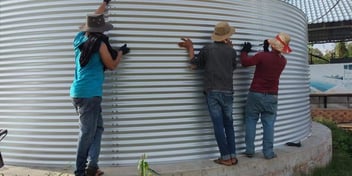Food and fashion draining world’s water supply: WaterAid
Products Australians might take for granted, like a cotton t-shirt or the avocado on their toast, are making it harder for marginalised communities around the world to access clean water, a new report from WaterAid warns.
According to the report, Beneath the Surface: The State of the World’s Water 2019, which was released ahead of World Water Day, four billion people across the globe live in areas of physical water scarcity, where for at least part of the year, demand for water exceeds supply.
These countries are often producers of items with considerable ‘water footprints’ (the amount of freshwater used in the production of an item), which are exported to high-income countries.
For example, cotton grown and produced in India has a water footprint of 22,500L/KG. Meanwhile, one billion Indians live with water scarcity.
Avocados are another thirsty crop, with a water footprint of about 2000L/KG, while an average cup of coffee, which contains about 200ml of water, about takes 140L to produce.
WaterAid Chief Executive Rosie Wheen called on consumers to be more mindful in their purchasing habits and said agricultural use of water “should not be prioritised over people’s ability to get water daily for their basic needs.''
“An urgent understanding is needed to ensure that the push for economic development through exports of food and clothing do not imperil current and future generations’ access to water,” Wheen said.
“There can be no sustainable economic development without sustainable and equitable access to water.”
Wheen also acknowledged water issues closer to home, including the ongoing drought in New South Wales and that Australia is on track to face high water stress by 2040.
“It’s the same crisis in a different location. We need to resolve the crisis everywhere,” she said.
“When you consider our experiences with droughts and water restrictions, Australians have a unique and personal insight into issues of water shortages and that helps us empathise with those most vulnerable to water scarcity.”
MDBA calls attention to issues at home
The unique Australian insight into water scarcity was also acknowledged by the Murray-Darling Basin Authority (MDBA), which chose World Water Day to kickoff a series of seminars on water reform in Australia.
Director of water advisory firm Aither, Will Fargher, who spoke at the MDBA’s first event, said the world looks to Australia for solutions to water scarcity and drought.
“The Murray-Darling Basin Plan might not be perfect, but Australia has made significant progress and we continue to do a lot of things right,” he said.
“Many countries are dealing with the same kind of challenges as we are, and are looking to our experience in the implementation of difficult reforms.
“Australia is recognised as a world leader in responding to water scarcity through its policies and approaches.”
World Water Day is celebrated on 22 March each year.


